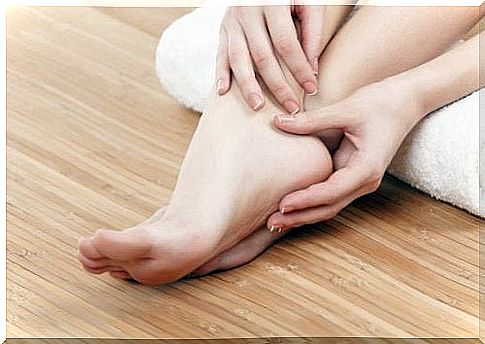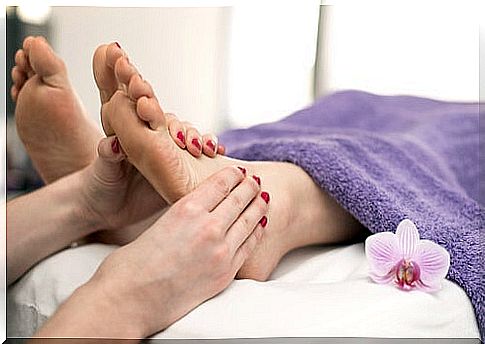Foot Swelling During Pregnancy: How To Prevent It

Swelling in the feet during the months of pregnancy is a common problem. It usually gets worse in the last trimester because of the accumulation of fluid in the tissues. Next, we’ll look at why we get swollen feet during pregnancy and the different ways to alleviate this swelling.
Edema in pregnancy: is it normal?
Suffering from foot swelling in pregnancy is a common nuisance. Heaviness in the legs and feet and discomfort at the time and walking are obvious signs of fluid retention. This inflammation in the lower extremities of the body, also called edema, happens most often in the last months of pregnancy.
All of this happens because of the baby’s weight. The uterus, larger at this stage, exerts pressure on the pelvic and cava veins, consequently slowing down blood circulation.
Why are feet swollen in pregnancy?
Feet become swollen in pregnancy because of an excessive accumulation of fluid in the tissues caused by changes in the properties of the blood. During these months, the amount of water in the body increases because of hormones, stimulating fluid retention. This excess is concentrated in the ankles and feet, causing common discomfort and a feeling of heaviness.
Also, there is increased blood flow which can cause some veins to clog. The greater amount of water in the body creates resistance and pressure on the blood circulation.
And the uterus, as it increases in size, presses on the pelvic and vena cava (which transports blood from the extremities to the heart). The pressure from the uterus slows down circulation, in addition to causing the fluid in the veins to be trapped in the extremities of the body.

Medicines to prevent edema
Although you are a healthy woman who has never suffered from edema, during pregnancy it is not uncommon for it to appear.
In addition to the aforementioned causes, sudden weight gain during pregnancy or the maintenance of inappropriate postures favor its appearance. It is good to avoid sedentary lifestyle and heat sources, as this increases the chances of inflammation.
Recommendations on how to avoid swelling:
1. Drink lots of water. Between eight and ten glasses of water a day is recommended. This eliminates toxins from the body and prevents fluid retention.
2. Take care of food. It’s critical to eat sufficient amounts of fruits and vegetables and avoid processed foods and salt.
3. Perform physical exercise. Sedentary lifestyle is the worst enemy for swollen feet in pregnancy. Therefore, the ideal is to perform moderate exercises to activate circulation. Hiking, yoga, or water exercises, such as water aerobics, are the most recommended.
4. Avoid staying in the same position too long. Sitting or standing for many hours is not good. On the contrary, it’s good to move, get up and take a few steps. At the same time, it’s also good to put your legs on a higher stool and never cross your feet and legs when sitting.
5. Stretch your legs forward and flex your ankles up to stretch your muscles.
6. Wear comfortable shoes with a special size for pregnant women.
7. To immerse your feet in cold or hot water. It is recommended to do this at the end of the day to serve as relaxation. In a basin, add hot water and salt. If you prefer cold water, add ice and leave your feet in the water for a few minutes. This will relieve swelling and activate your circulation.
8. Relaxing massages. One piece of advice to alleviate the feeling of swelling is to massage the area. Taking care of your feet using moisturizing creams and massage making gentle circles in the area will stimulate circulation.
9. Lean on your side. This will help relieve pressure on your veins.

What signs should I pay attention to?
As we saw earlier, swelling in the feet, legs, and ankles is common during the last few months of pregnancy. However, it must be taken into account to what extent it is normal and when it is necessary to resort to a specialist.
If you notice that any of the situations described below happen, seek your doctor immediately:
- In addition to the lower extremities, when we notice that the face, hands and area around the eyes become swollen.
- Exaggerated or sudden swelling in the feet.
- If the swelling lasts longer than usual, even though you have taken the precautions described.
- If one leg is more swollen than the other or if there is any pain.
And remember, this is often a common, temporary nuisance. So there is no need to worry too much. At first, just follow the suggested recommendations.









